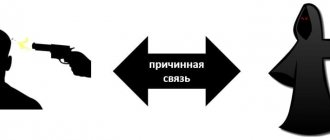The accusation brought against a person is not always confirmed in court. In such cases, an acquittal is rendered and the person is released from liability. In other situations, the evidence only partially confirms guilt, which most often requires changing the article of the law. In criminal law there is a term “reclassification” of a crime, which means changing the charge. When it is permissible to requalify an article of the code and who has the right to do this, read our article.
Retraining in criminal law
The concept of “qualification” is absent in criminal procedural legislation. In essence, this is a legal comparison of the actions that a person committed with the characteristics of one or more articles of the criminal code. If the signs coincide, then a crime has occurred; if not, then there can be no criminal prosecution.
Example No. 1 . Burykin A.P. committed theft from a store in the amount of 7,000 rubles. Comparing his actions with the signs of Art. 158 of the Criminal Code of the Russian Federation (theft), the investigator is convinced that such criteria as secrecy (no one saw the theft), illegality of taking the property of another owner (in this case, a legal entity), as well as the amount of the stolen property have been confirmed. Since all signs of a crime have been confirmed, Burykin’s actions are qualified under Art. 158 of the Criminal Code of the Russian Federation.
Example No. 2 . Under the same circumstances of theft by Burykin A.P. from the same store all the signs of a crime under Art. 158 of the Criminal Code of the Russian Federation, were confirmed, except for the amount. It was mistakenly inflated, and, as it turned out, the thief stole goods worth only 300 rubles. Based on the minimum required amount to initiate a criminal case, there will be no corpus delicti in Burykin’s actions, since the qualification, or rather one of the mandatory qualifying features of theft, has not been confirmed.
According to general rules, a person against whom a criminal case has been initiated must be charged.
Example No. 3 . For example, apartment thief Tarasov R.R. caught at the scene of the incident. At the request of the victim, a criminal case was opened against him under paragraph “a” of Part 3 of Art. 158 of the Criminal Code of the Russian Federation - theft with illegal entry into a home. During the investigation, it turns out that Tarasov R.R. - this is the landlady’s former partner, to whom she gave the second copy of the keys to the apartment and allowed him to come in her absence. Actions of Tarasov R.R. were reclassified: the sign “with illegal entry into the home” was excluded, since the illegality of entering the apartment was not established. But the owner did not allow her microwave, vacuum cleaner and TV to be taken out and sold. These things belonged to her solely, and Tarasov R.R. He took them out and sold them, and spent the proceeds from the sale on booze. He was charged and convicted under paragraph “c” of Part 2 of Art. 158 of the Criminal Code of the Russian Federation for theft causing significant damage to the victim. Thus, he was criminally liable, but for a less serious crime.
From the example we see that the lack of proof of one of the qualifying criteria became the basis for changing the charge in the direction of improving the legal status of the criminal.
Question: Is the opposite situation possible, when a minor crime is reclassified as a serious one?
Yes, from a legal point of view this is permissible.
Example No. 4 . Samorukov M.A. beat up a neighbor, who was taken by ambulance to the hospital and diagnosed with a traumatic brain injury. In relation to Samorukov M.A. a criminal case was initiated under Part 1 of Art. 111 of the Criminal Code of the Russian Federation - intentional infliction of grievous bodily harm (punishment up to 8 years in prison). After 2 days, the neighbor became ill and died in the hospital without waking up from a coma. According to the conclusion of the forensic expert, the death of the victim was in direct causal connection with the beating. Actions of Samorukov M.A. were reclassified under Part 4 of Art. 111 of the Criminal Code of the Russian Federation – causing grievous bodily harm resulting in death (punishment up to 15 years in prison).
From the fourth example, we see that the position of the accused worsened: immediately after the crime he was accused of committing a serious crime, and later, taking into account the consequences in the form of the death of the victim, he was accused of committing a particularly serious one.
You should know that changing the charges “in any direction” is possible only at the preliminary investigation stage. In court, reclassification is allowed only in the direction of mitigating the defendant’s position in comparison with what was presented in the indictment by the investigative authorities.
If reclassification is necessary due to changes in criminal legislation, it is possible to apply the new qualification to persons who have already committed a crime if the new law softens their situation. This rule must be observed both at the investigation stage and in court.
Example No. 5 . In 2022, Golikova P.R., while driving while intoxicated, hit an elderly man at a pedestrian crossing to death and fled the scene, she was charged under Part 4 of Art. 264 of the Criminal Code of the Russian Federation - violation of traffic rules by a driver in a state of intoxication, resulting in the death of a person through negligence. Since 2022, this norm of the Criminal Code of the Russian Federation has been in effect in a new edition: the term of imprisonment has been increased (it was up to 7 years, now up to 12 years), and a separate qualifying feature is provided for “leaving the scene of an accident”, which was previously in part 4 of Art. . 264 of the Criminal Code of the Russian Federation did not exist. Since at the time of adoption of these changes the crime had already been committed by P.R. Golikova, a new law that would worsen her situation cannot be applied to her; reclassification is impossible here. Golikova was convicted under Part 4 of Art. 264 of the Criminal Code of the Russian Federation in the old, softer version.
By the way, a change in the category of a crime should be distinguished from reclassification as such. So, in accordance with Part 6 of Art. 15 of the Criminal Code of the Russian Federation, the court has the right to change the category of crime to a milder one in cases where there are mitigating and no aggravating circumstances.
Example No. 6 . Loskutov E.P. was accused of committing fraud under Part 3 of Art. 159 of the Criminal Code of the Russian Federation, causing damage to the victim in the amount of 260,000 rubles. He fully admitted his guilt, paid all the damage and even additionally compensated for moral damage, and had never been convicted before. By a court decision, the category of a serious crime, which includes Part 3 of Art. 159 of the Criminal Code of the Russian Federation, for the category of moderate severity - Part 2 of Art. 159 of the Criminal Code of the Russian Federation, according to which reconciliation is possible. As a result, the case was dismissed at the request of the victim for reconciliation of the parties, which could not have been done under the previous part of the article. Changing the category is not a reclassification, although in fact part of the article of the Criminal Code is changed to another.
The main rule when reclassifying from one crime to another is the coincidence of the object of the attack. Thus, it is impossible to reclassify theft as causing bodily harm, or fraud as a threat to kill.
Let us consider in detail the procedure of how requalification occurs at different stages of criminal prosecution.
Reasons for change
Regardless of the exact stage at which the criminal’s actions are reclassified, everything in any case must be reflected in the procedural documents. Most often this applies to intentional crimes. The change can occur several times. The main thing is that there are relevant reasons:
- The factual data in the case, which previously served as the reason for qualification under a certain article of the Criminal Code, have changed. Instead of hooliganism committed in a public place (a clear disrespect for society), it turned out that the result was bodily harm on the bus due to hostile relations between people. Consequently, liability will already arise under a completely different article (Article 115).
- The criminal law changed while the investigation process was underway. The new Criminal Code, which began operating in 1997, caused a great stir. Reclassification in this case took place in the presence of “softer” crimes. Also, previously recognized crimes were equated with non-criminal ones. This process is commonly called decriminalization of the actions of the perpetrator.
- Investigator's mistake. All circumstances in the case remained original and have not undergone any changes. The reasons for such an action may be the lack of a correct interpretation of the committed acts by the perpetrator or qualification with a “reserve” when a person is charged with a more severe article of the Criminal Code.
When choosing each of these items, you should carefully approach the investigation process. It is not uncommon for an article to be requalified several times in different areas.
The procedure for reclassifying a criminal case at the pre-trial stage
The investigator is an independent official who has the right, based on the case materials, on his own initiative to make decisions on the scope of the charges brought against the person - to leave the article of the Criminal Code of the Russian Federation in its original form or to change it.
If the accused believes that his actions do not relate to the crime that he is charged with, he can contact the official conducting the investigation (inquiry). You can file a petition to change your qualifications, which must be resolved by the investigator or inquiry officer within three days . Based on the results of the consideration, a decision is made to satisfy or refuse the request. A copy of the decision is sent to interested parties; the refusal can be appealed to the leadership of the investigative body, to the prosecutor's office or to the court.
Usually the petition is made by a lawyer or the accused himself. You can use the example:
Investigator of the interdistrict department of the Investigative Committee of the Investigative Directorate for the Mironovskaya region A.M. Popov.
accused Miroshnikov R.P., living in Mironovsk, st. Zheleznova, 9 tel. 889990 preventive measure - recognizance not to leave
Petition for reclassification of a crime (sample)
Your proceedings include criminal case No. 0000000 against R.P. Miroshnikov, that is, me, for committing a crime under paragraph “c” of Part 3 of Art. 286 of the Criminal Code of the Russian Federation - the commission by an official of actions that clearly go beyond the scope of his powers and entail a significant violation of the rights and legitimate interests of citizens or the state, causing grave consequences.
This crime provides for in paragraph “c” the infliction of grave consequences that occurred as a result of an official exceeding his official powers.
As follows from the charges brought against me, according to the investigation, while holding the position of head of the district administration’s financing department, I exceeded my authority by approving the cost estimate for non-existent costs. At the same time, the investigator did not indicate exactly what grave consequences occurred as a result of my actions.
In this regard, my actions should be reclassified under Part 1 of Art. 286 of the Criminal Code of the Russian Federation as abuse of official powers, excluding the sign provided for in paragraph “c” of Part 3 of Art. 286 of the Criminal Code of the Russian Federation.
Based on the above, guided by Art. Art. 38, 119-122, 175 of the Criminal Procedure Code of the Russian Federation,
ASK:
Reclassify my actions in criminal case No. 0000000 from paragraph “a” of Part 3 of Art. 286 of the Criminal Code of the Russian Federation, Part 1, Art. 286 of the Criminal Code of the Russian Federation, issue an appropriate resolution.
Notify me and my lawyer about the decision.
Miroshnikov R.P., number, signature.
In the above example, we see that the petition contains references to several articles of the Code of Criminal Procedure of the Russian Federation:
- Art. 38 of the Code of Criminal Procedure of the Russian Federation – a general article on the powers of the investigator. A reference to this norm is necessary because it means an appeal to the proper person: it is the investigator who, at the pre-trial stage, resolves petitions, including those for changing qualifications. If an inquiry is being carried out in the case, and not an investigation (for example, for minor crimes - petty theft (Part 1 of Article 158 of the Criminal Code of the Russian Federation), insulting a representative of the authorities (Article 319 of the Criminal Code of the Russian Federation), etc.), then it is necessary to refer at the station 41 of the Code of Criminal Procedure of the Russian Federation (the investigator and his powers).
- Art. Art. 119-122 of the Code of Criminal Procedure of the Russian Federation - general rules for resolving any petitions that are submitted at the pre-trial stage. Such petitions may be requests for the inclusion of any documents, for the interrogation of a person, applications for termination of the case, for changing the preventive measure, etc., including a request for requalification. The petition can be submitted not only by the accused, but also by the victim and lawyers. The witness is not given the right by law to ask for an amendment to an article of the Criminal Code of the Russian Federation.
- Art. 175 of the Code of Criminal Procedure of the Russian Federation is the main article in accordance with which the charge can be changed. According to the rules of this norm, the investigator is obliged to make one of two decisions:
- about bringing him as an accused with a new qualification. For example, if a person was accused of robbery, and subsequently evidence of the use of violence appeared, then the investigator, by his decision, brings charges of robbery with the use of violence. The previous decision to prosecute a person for “simple” robbery is no longer valid.
- on termination of the criminal case in part. For example, if a person was accused of two crimes under the article “fraud,” but one of the acts was not confirmed. In such a situation, the investigator, by his decision, terminates the case for the second crime. For the remaining episode of fraud, the case is sent to court for consideration.
Question: Is it necessary to submit an application for requalification as a separate document?
No, not necessarily. You can apply for a change of charge:
- during the interrogation in the protocol . The interrogation protocol form provides for recording statements and comments during the procedure or immediately after it. The defense lawyer or the accused (suspect) has the right to personally reflect the application for a change in qualifications in the appropriate column, certifying it with his signature.
- upon reviewing the case . Article 217 of the Code of Criminal Procedure of the Russian Federation provides for the right of the accused and the defense attorney to fully familiarize themselves with all the materials of the case at the end of the preliminary investigation. The investigator cannot refuse to exercise such a right, otherwise such a refusal will be considered a gross violation of the law. In the familiarization form, when fulfilling the requirements of Art. 217 of the Code of Criminal Procedure of the Russian Federation there is a special column in which the accused or defense attorney has the right to submit a written petition, including disagreement with the qualifications.
The law does not prohibit making any requests orally, but we still recommend doing so in writing (in a separate document or by recording it in the minutes). The responsibility to record oral comments lies with the investigator, who, due to subjective perception, may verbatim record phrases spoken by the applicant. By preparing the request in writing, the applicant can be sure that the meaning of the request will not be lost or distorted.
Regardless of the form in which the change in the classification of the actions of the accused was announced, the investigator is obliged to resolve the petition immediately or, if this is not possible, within three days. The investigator makes a decision about this:
- to satisfy the request in whole or in part . If the investigator considers that the application is justified and the accusation is not fully confirmed, then a decision is made to satisfy the application and a decision to terminate the case. If the accusation is not partially confirmed, then a decision is made to partially satisfy the application and reclassify the crime, and subsequently - a decision to terminate the criminal prosecution in the part that is not proven.
- about refusal to satisfy the petition . If the investigator considers that it is impossible to change the qualifications and the application is unfounded, he issues a decision to refuse satisfaction.
Copies of decisions are issued to applicants (in person or sent by mail). Let us remind you once again that at the investigation stage the charges may change either for the worse for the person or in the direction of mitigation. In other words, the person involved in the case may be requalified under a more serious article than previously.
Thus, the investigator can independently re-qualify the charge or decide to refuse to satisfy the stated petition. A refusal, like any action or inaction of a representative of a law enforcement agency, can be appealed to the head of the investigative agency, to the prosecutor's office or to the court.
Most often, persons who do not agree with the refusal turn to the prosecutor's office, since it is this department that oversees compliance with the laws in the investigation of all criminal cases. You can use the example:
To the prosecutor's office of the Leninsky district of Krasnodar
From the accused Saprykin P.R., in criminal case No. 202020/19, which is being processed by the Investigation Department of the Ministry of Internal Affairs for the Leninsky district of Krasnodar.
living at the address: Krasnodar, st. Rybnaya, 2 Tel. 892000
COMPLAINT against the actions of the investigator
In the proceedings of the investigator of the Investigative Department of the Ministry of Internal Affairs for the Leninsky district of Krasnodar, D.D. Mamonov. There is a criminal case No. 202020/19 against Saprykin P.R., that is, me, and Mikhailov N.O., accused of committing a crime under paragraph “a” of Part 2 of Art. 158 of the Criminal Code of the Russian Federation (theft committed by a group of persons by prior conspiracy).
11/21/2019 by me to investigator D.D. Mamonov. Through the office of the Investigative Department of the Ministry of Internal Affairs for the Leninsky district of Krasnodar, a petition was submitted to reclassify my actions from paragraph “a” of Part 2 of Art. 158 of the Criminal Code of the Russian Federation on Part 1 of Art. 158 of the Criminal Code of the Russian Federation, since the case contains information about the absence of conspiracy to commit a crime. The petition was registered in the incoming correspondence journal under number 2190/19 dated November 21, 2019.
At present, a decision on my petition has not been made, while the three-day period for permission provided for in Art. 121 of the Code of Criminal Procedure of the Russian Federation has expired. Charge under paragraph “a” of Part 2 of Art. 158 of the Criminal Code of the Russian Federation, which was unreasonably brought against me and N.O. Mikhailov, has not been changed at present.
Based on the above, guided by art. 124 of the Criminal Procedure Code of the Russian Federation,
ASK:
Conduct an inspection of the inactions of the investigator of the Investigative Department of the Ministry of Internal Affairs for the Leninsky District of Krasnodar Mamonov D.D. in criminal case No. 2020202/19 to resolve the petition for reclassification, request the case.
Oblige to eliminate violations of criminal procedure legislation.
Please send the decision on this complaint by mail to the address: st. Rybnaya, 2, Krasnodar.
Saprykin P.R., number, signature.
In the sample, we deliberately appealed not only the lack of measures taken by the investigator to change his qualifications, but also his inaction in resolving the petition. According to the law, none of the submitted requests can remain unanswered; all of them must be resolved.
A complaint submitted to the prosecutor must be considered within 3-10 (in complex cases - 30) days ; the response can be appealed to a higher prosecutor's office. If it was not possible to change the charges at the investigation stage, the law allows similar requests to be made again during the court hearing when considering the case on the merits.
Legal assistance from a lawyer
A person against whom a criminal case has been filed should remember that with the support of a criminal lawyer, you can change the entire course of the process and prevent seemingly irreversible consequences. Re-qualification of the article is required in cases where the accused, due to certain circumstances, cannot count on an acquittal or a short sentence.
Legal assistance from a lawyer is extremely important - carefully thought-out actions by a specialist will definitely help to reclassify the article of the Criminal Code. Long-term practice shows that initially the investigative authorities greatly overestimate the qualifications of the article, focusing only on aggravating circumstances.
We suggest you read: How to open a criminal case against a debtor
According to statistical data, the grounds for retraining, in most cases, are:
- newly discovered circumstances that can mitigate the subject’s guilt;
- new legal provisions;
- procedural violations.
Each case is individual and unique, so there is no algorithm of actions that must be followed in order to achieve a mitigation of the article. A consultation with a lawyer is the first stage of the defense; during it, a specialist studies all the nuances of the case and develops tactics that are most appropriate to the prevailing circumstances.
There are no barriers for a qualified lawyer - he will immediately use any procedural error or shortcoming in the interests of his client. And if you seek legal help in a timely manner, the chances of success increase many times over. This applies not only to the criminal sphere, but also to a petition for reclassification of an administrative offense. A lawyer will always help with this too!
Reclassification of a crime at the judicial stage
From the moment the case comes to court, the parties have the rights and obligations of participants in legal proceedings. Rights include providing evidence, familiarizing yourself with all case materials, filing petitions to order examinations, calling witnesses, and requesting documents from organizations. The petition can be of any kind, including its content, which may raise the question of reclassifying the actions of the accused.
As at the investigation stage, petitions can be submitted by the accused and his defense attorney, the victim and his representative. A witness cannot apply for requalification.
As we have already written, at the stage of consideration of the case it is impossible to reclassify the act as more serious, since the charge can only be changed in the direction of mitigation.
The petition is written in free form:
To the Leninsky District Court of Krasnodar, Judge Ivanova I.I.
From the defendant Limonov P.O., in criminal case No. 1212/20 on charges of committing a crime under paragraph “z” of Part 2 of Art. 111 of the Criminal Code of the Russian Federation
Detained in pre-trial detention center-3 of the Federal Penitentiary Service of Russia in the Krasnodar Territory
Petition in a criminal case for re-qualification of an article of the Criminal Code of the Russian Federation
Your proceedings are pending a criminal case against P.O. Limonov, that is, me, accused of committing a crime under paragraph “h” of Part 2 of Art. 111 of the Criminal Code of the Russian Federation - intentionally causing Lopatina V.V. grievous bodily harm, dangerous to life and health, with the use of an object used as a weapon.
At the court hearing held on November 14, 2019, the victim V.V. Lopatina explained to the court that I beat her with my hands, without using a wooden stick, which is unreasonably stated in the indictment. In addition, my testimony given during the investigation as a suspect and accused does not contain information about beating Lopatina with the use of any objects. At the same time, I do not deny my guilt in causing bodily harm to the victim and have not denied it before.
Based on the above, guided by Art. Art. 119, 175 Code of Criminal Procedure of the Russian Federation,
ASK:
Reclassify my actions in criminal case No. 1212/20 from paragraph “z” of Part 2 of Art. 111 of the Criminal Code of the Russian Federation on Part 1 of Art. 111 of the Criminal Code of the Russian Federation.
Defendant Limonov P.O., number, signature.
As such, the Criminal Procedure Code does not specifically provide for rules on the procedure for submitting a petition to the court. Some recommendations can be given based on judicial practice:
1. If the petition is short, then it is permissible to state it orally during the consideration of the case. Currently, all court proceedings are required to be audio-recorded, with the secretary keeping minutes of the hearing. This means that any statement of a participant in the process is recorded twice: in writing in the protocol and on audio media using a special program.
These legal requirements relieve the applicant from having to worry that his words will not be recorded. In addition, each participant has the right to familiarize himself with both the minutes of the meeting on paper and with audio files, and, in case of discrepancy, bring his comments in accordance with Art. 260 Code of Criminal Procedure of the Russian Federation.
2. The time for filing a petition is not specified in the law. You can submit a written petition to the office before the trial (if the applicant is a person in custody, submit it by mail through the administration of the pre-trial detention center), you can do this directly during the trial.
We recommend making a copy of the written petition for the opposing party in the case. This is not an obligation, but serves as a sign of respect for the participants and the court as a whole.
3. At what point in the process can you tell the judge about requalification? Almost at any time, but most often they do it:
- at the stage of a preliminary hearing, when a request for its holding is made or the judge, on his own initiative, appoints such a hearing by his decision. Thus, after receiving a copy of the indictment, the accused and other participants have the right to apply to the judge to schedule a preliminary hearing to resolve various issues - exclusion of evidence from those presented, suspension and termination of the case, return of materials to the prosecutor, etc. The issues listed are often directly related to the issue of misqualification. Example No. 7 , if the defense attorney declares disagreement with the qualifications and, in general, with the presence of corpus delicti in the actions of the client, he simultaneously asks to dismiss the case - therefore, he has the right to declare a preliminary hearing and at it express his opinion on the article of the Criminal Code. In situations where the defense requests the exclusion of evidence, this most often affects the scope of the charge and may lead to the exclusion of one or more episodes of criminal activity (of course, if the request to exclude evidence is granted). There are situations when, at a preliminary hearing, they are asked to return the case to the prosecutor to resume the investigation, since the applicant points out a discrepancy in qualifications and believes that the article of the criminal code should be different, for a more serious crime.
- at the stage of resolving motions - at the very beginning of the trial, after the judge has established the identity of the defendant, the victim, announced the composition of the court, and explained the rights and obligations to everyone. After this, the court asks the parties whether anyone has any statements or motions. At this point, you can declare a reclassification of the defendant’s actions.
- at any other time with the permission of the presiding officer.
The court is obliged to consider the received petition and make a ruling on it.
If it is requested to terminate the case in part or in full, and such a request is found to be justified, then the court issues a decision to terminate the prosecution. By the way, the court is obliged to make a decision to terminate if the prosecutor (state prosecutor) refuses to partly or completely prosecute the person.
In practice, petitions to reclassify the defendant’s actions are left by the court for resolution in the deliberation room, where the court will retire after examining all the evidence, listening to the parties’ arguments and the defendant’s last word.
While in the deliberation room, the judge analyzes everything presented by the parties: testimony of witnesses, victims, documents, characterizing data, etc.
The law obliges the judge, when passing a sentence, to answer not only the question of the person’s guilt, but also about his qualifications, and each qualifying feature must be described and indicated in the sentence, how it is confirmed or not confirmed. Therefore, often after filing a motion to change the charge, the judge listens to the opinions of other participants, but makes a decision on it in the deliberation room, indicating the result in the verdict, without issuing a separate document. This approach is not a violation of the requirements of the Code of Criminal Procedure of the Russian Federation and has long been practiced by courts of general jurisdiction.
Example No. 8 . In the middle of the proceedings, the defendant's defense attorney filed a motion to order a forensic examination in the fraud case. The court agreed with the opinion that additional economic research was necessary and ordered an examination. The expert’s conclusion indicated that the amount of damage caused to the victim was not one and a half million rubles, but lower: 300,000 rubles. This circumstance directly affected the qualification: the actions of the defendant could no longer be qualified under Part 4 of Art. 159 of the Criminal Code of the Russian Federation (with the sign “damage of more than one million rubles”), as it was charged by the investigation. The defender filed another petition - to reclassify the actions under Part 3 of Art. 159 of the Criminal Code of the Russian Federation (with the sign of “major damage” - more than 250,000 rubles, but less than one million). The court heard the position of all participants in the case, but postponed making a decision on it. After the end of the trial, the judge retired to the deliberation room and rendered a verdict in which he justified the transition to Part 3 of Art. 159 of the Criminal Code of the Russian Federation, thereby, in essence, satisfying the petition.
In a similar situation, if the judge considers the request to change the charges unfounded, then the verdict reflects the reasons for which he came to such conclusions and the evidence supporting the original charge.
Let us note that the court has the right to change the qualification not only in the first instance. In practice, there are situations when, when considering an appeal or cassation complaint, the judicial panels of higher courts changed the charge towards improvement if they came to such a conclusion. The criminal procedure law allows you to change the qualifications even after a sentence has already taken place.
Procedural features
Regardless of the stage of the investigation of the case or its consideration in court, the requalification process has its own characteristics.
- Retraining is limited by law. This primarily applies to cases where the situation of the persecuted person becomes worse. In addition, not every participant in the process can take action independently. So, for example, the prosecutor does not have the right to apply against the accused a more serious article in relation to the existing one. In this case, he will have to send the case back to the investigator for additional verification and selection of a new article. It is always possible to make a smaller article, since the position of the perpetrator of criminal acts will become better.
- Recording of requalification in documents according to the rules of the Code of Criminal Procedure. This is due to the subsequent development of the process and the choice of jurisdiction in a criminal case, as well as the court competent to consider the case and pass a verdict. After all, there are some categories of cases where it is impossible to do without a lawyer. This also applies to private prosecution cases, when the powers of all participants may be expanded or narrowed.
Supervisory proceedings
There are other stages of the process when reclassification of criminal actions can be carried out. This applies to appeal, supervisory, and cassation proceedings. Such measures will be applicable in accordance with procedural law if violations are established on the part of the court of 1st instance that violated the rules of law. Such violations include:
- The sentence did not apply the article that should correspond to the actions committed, and also applied slightly different paragraphs or parts of the articles. This is most typical when there are qualifying characteristics, they are recognized as such or, conversely, removed from the essence of the accusation.
- The requirements of the General Part of the Criminal Code were violated.
- The person was subject to more stringent penalties than those prescribed in the sanctions, for which the person was punished.
If the supervisory authority determines that the norms of the criminal law have been violated, immediately there will be grounds for adjusting the court verdict. This is done after a detailed study of the criminal case. The main reason for such events is incorrect pre-qualification. The convicted person’s lawyer can also contribute to this. Its main goal is to select a more lenient punishment for the defendant.
Consequently, a defender can best express himself not at one stage of the process, but at each of them. During the investigation, a search for factual data is carried out, giving the accused a mitigating factor, and at trial, it is necessary to prove the correction of the person. In the future, complaints and demands are sent from him to change the punishment to a more lenient one for appropriate reasons.
The prescribed process is due to the presence of related compounds. This causes some controversy in practical application. In any case, justice should be sought, including in choosing the correct punishment that corresponds to criminal actions.








